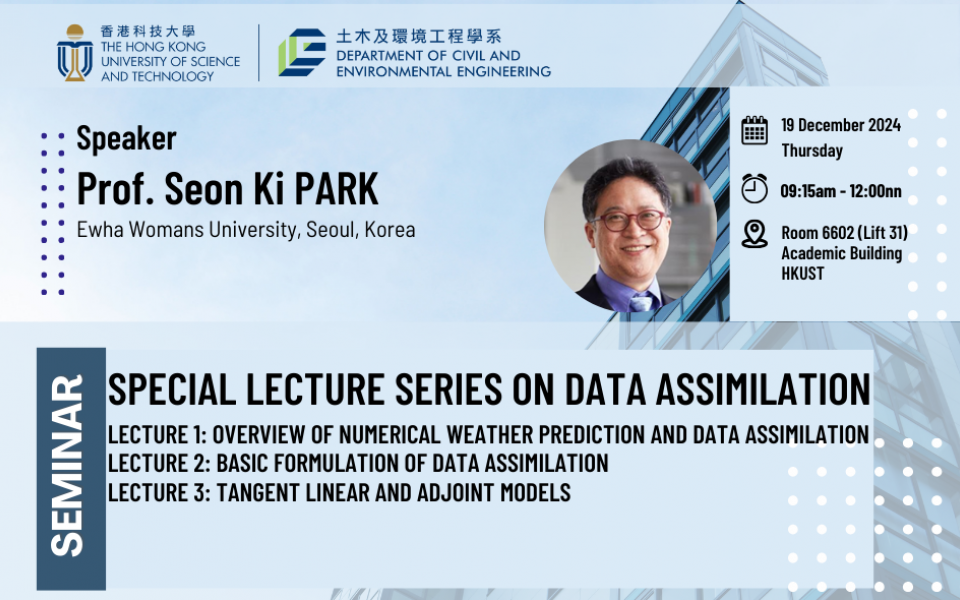Civil Engineering Departmental Seminar - SPECIAL LECTURE SERIES ON DATA ASSIMILATION
LECTURE 1: OVERVIEW OF NUMERICAL WEATHER PREDICTION AND DATA ASSIMILATION
LECTURE 2: BASIC FORMULATION OF DATA ASSIMILATION
LECTURE 3: TANGENT LINEAR AND ADJOINT MODELS
Supporting the below United Nations Sustainable Development Goals:支持以下聯合國可持續發展目標:支持以下联合国可持续发展目标:
SPECIAL LECTURE SERIES ON DATA ASSIMILATION
LECTURE 1: OVERVIEW OF NUMERICAL WEATHER PREDICTION AND DATA ASSIMILATION
LECTURE 2: BASIC FORMULATION OF DATA ASSIMILATION
LECTURE 3: TANGENT LINEAR AND ADJOINT MODELS
Numerical weather prediction (NWP) is a state-of-art technology in operational meteorology for objective forecast of weather systems. In a changing climate, we are confronting with extreme weather events; thus, accurate forecasts of such events are essential. Among the uncertainties of NWP that come from many sources, those in the initial and boundary conditions can be reduced by data assimilation while those in the subgrid-scale physical parameterizations can be alleviated by parameter optimization. In this series of special lectures on data assimilation (DA), three lectures will be given.
Lecture 1 covers a general overview on NWP and DA, including history and major components of these advanced techniques and examples of applications. In Lecture 2, the basic concept and formulation of DA will be covered based on Chapter 1 of the textbook (Park and Zupanski, 2022), including observation operator, analysis equation, least squared estimation, Best Least-Squared Unbiased Estimation (BLUE), Optimal Interpolation (OI), etc. Lecture 3 introduces derivation and coding of the tangent linear model (TLM) and the adjoint model (ADJM), based on Chapter 4 of the textbook, which are widely used for sensitivity analysis, optimization, and variational data assimilation. These lectures are aimed at providing high-level undergraduate students as well as graduate students with scientific backgrounds on DA.
Dr. Seon Ki Park is Professor of Climate and Energy Systems Engineering at the Ewha Womans University (EWU), Seoul, Korea; he established and served as the Founding Directors of two research centers at EWU --- the Severe Storm Research Center (SSRC) and the Center for Climate/Environment Change Prediction Research (CCCPR). His research focuses on storm- and meso-scale meteorology, coupled modeling of land surface-atmosphere-chemistry, and numerical prediction of high-impact weather/climate/environment, including data assimilation and parameter optimization. He obtained a Ph.D. in Meteorology from the University of Oklahoma (OU) in 1996, then worked as a research scientist at OU, University of Maryland and NASA/GSFC before he joined EWU in 2001. He has served the university administration as Director of Environmental Science and Engineering, Associate Dean of Engineering, and Vice President of University Planning and Coordination. He received several awards from EWU such as the Teaching Excellence Award, the Research Excellence Award, and the Research Grant Excellence Award, and from the Korean government such as the Administrator’s Award (Korea Meteorological Administration), the Minister’s Award (Ministry of Environment), and the Service Merit Medal (Government of Korea). He has also served as the President of Atmospheric Sciences Section of the Asia Oceania Geosciences Society (AOGS) in 2012-2014, and currently serves as the President of the Korean Meteorological Society (KMS) in 2024-2025. He co-edited a series of editorial volumes, Data Assimilation for Atmospheric, Oceanic and Hydrologic Applications (2009, 2013, 2017, 2022; Springer); he co-authored a textbook, Principles of Data Assimilation (2022; Cambridge University Press); he also edited a book, Numerical Weather Prediction: East Asian Perspectives (2023; Springer). He has been the main host and organizer of the Ewha International School on Data Assimilation (EISDA) since 2012.
